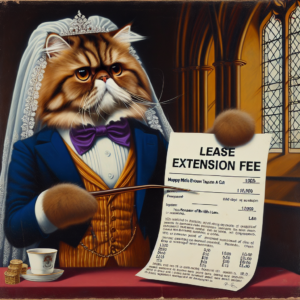Leasehold Flats in the UK: The Intricacies of Marriage Value and its Implications

Leasehold Flats in the UK: The Intricacies of Marriage Value and its Implications
Understanding Leasehold Flats in the UK: An Overview of the Intricacies
Leasehold flats are a common form of property ownership in the UK, particularly in urban areas where space is limited. In this arrangement, the leaseholder owns the right to occupy the property for a fixed period of time, typically between 99 and 999 years, while the freeholder retains ownership of the land. While leasehold ownership offers certain advantages, such as shared maintenance responsibilities and access to communal facilities, it also comes with its own set of intricacies.
One of the key intricacies of leasehold flats in the UK is the concept of marriage value. Marriage value refers to the increase in the value of a leasehold property when the lease term falls below 80 years. This increase is calculated based on the difference between the value of the property with a long lease and the value of the property with a short lease. The idea behind marriage value is that as the lease term decreases, the value of the property diminishes, and therefore, the leaseholder should compensate the freeholder for the loss in value.
Exploring the Concept of Marriage Value in Leasehold Flats: What You Need to Know
To understand marriage value in leasehold flats, it is important to grasp the concept of leasehold enfranchisement. Leasehold enfranchisement is the process by which leaseholders can extend their lease or collectively purchase the freehold of their property. When a lease term falls below 80 years, the marriage value becomes a significant factor in the cost of lease extension or freehold purchase.
The calculation of marriage value can be complex and is subject to various factors, including the market value of the property, the remaining lease term, and the ground rent. For example, if a leaseholder with a 70-year lease wishes to extend their lease or purchase the freehold, they would need to pay the marriage value, which could be a substantial amount. This can be a significant financial burden for leasehold flat owners, especially if they are not prepared for the implications of marriage value.
The Implications of Marriage Value on Leasehold Flats: A Closer Look at the Financial Impact
The financial impact of marriage value on leasehold flats can be substantial. The cost of extending a lease or purchasing the freehold can increase significantly as the lease term decreases. According to a report by the Leasehold Advisory Service, the marriage value can account for up to 50% of the total cost of lease-extension or freehold purchase. This means that leasehold flat owners may have to pay a considerable amount to compensate the freeholder for the loss in value caused by the shorter lease term.
The implications of marriage value can be particularly challenging for leasehold flat owners who are already facing financial constraints. For example, first-time buyers who have purchased leasehold flats with short lease terms may find it difficult to secure mortgage financing due to the potential cost of extending the lease. This can limit their options and make it harder for them to move up the property ladder.
Navigating the Complexities of Marriage Value: Tips for Leasehold Flat Owners in the UK
While marriage value can present challenges for leasehold flat owners, there are steps that can be taken to navigate these complexities. Firstly, it is important for leasehold flat owners to be aware of the remaining lease term and plan ahead. By understanding the implications of marriage value, they can make informed decisions about lease extension or freehold purchase well in advance.
The Leasehold Advisory Service provides a free calculator here: https://www.lease-advice.org/calculator/ for you to be able to get a good estimate of what your lease extension should cost.
Secondly, leasehold flat owners should seek professional advice from solicitors or surveyors who specialize in leasehold enfranchisement. These experts can provide guidance on the calculation of marriage value and negotiate on behalf of the leaseholder to ensure a fair outcome.
Lastly, leasehold flat owners can consider joining or forming a residents’ association to collectively negotiate lease extensions or freehold purchases. By pooling resources and working together, leaseholders can have a stronger bargaining position and potentially reduce the financial impact of marriage value.
In conclusion, leasehold flats in the UK come with their own intricacies, including the concept of marriage value. Understanding marriage value and its implications is crucial for leasehold flat owners, as it can have a significant financial impact. By being aware of the remaining lease term, seeking professional advice, and considering collective action, leasehold flat owners can navigate the complexities of marriage value and make informed decisions about their property ownership.
If you have a short-lease flat for sale or need some help with selling or extending your lease, get in touch today. Talk to Teddy our resident Property Persian cat or a team member on 020 8669 1169.
